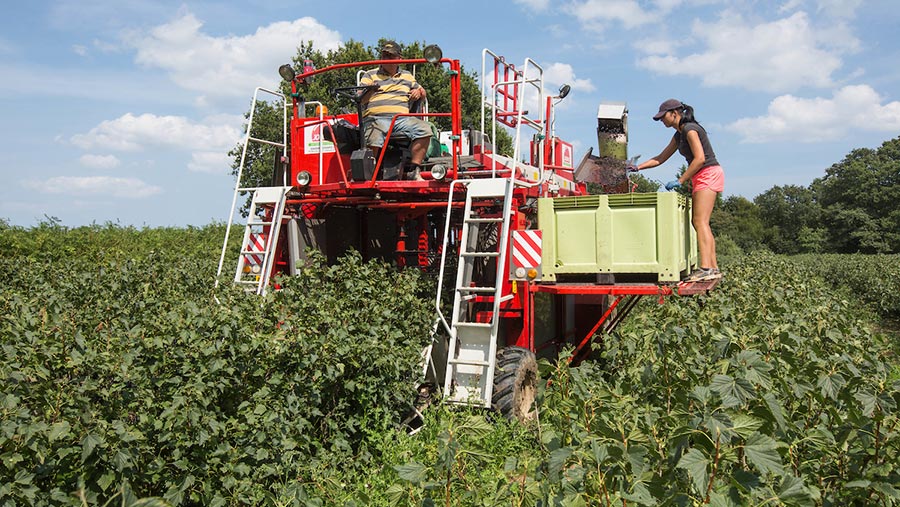Government’s labour policy ‘crippling food sector’, say farm leaders
 © Tim Scrivener
© Tim Scrivener Food and farming industry leaders have blasted the government’s post-Brexit farm labour policy, which they claim is adding to the cost-of-living crisis and failing to ensure food security.
A public evidence session of the UK Trade and Business Commission on Thursday (30 June) focused on the cost-of-living crisis, food inflation and the UK government’s new National Food Strategy.
James Withers, chief executive of Food and Drink Scotland, said Brexit had triggered a weaker pound, extra costs for businesses, labour market shortages and new red tape.
See also: Tonnes of food crops ploughed in as labour shortage bites
“Brexit has made absolutely nothing better and it’s made a lot of things worse,” he added.
A very clear take on the impact of Brexit on food security and the cost of living from @scotfoodjames: "Brexit has made absolutely nothing better and it's made a lot of things worse," citing:
– Weaker pound
– Extra costs for businesses
– Labour market shortages
– New red tape pic.twitter.com/EnBx5EFZrg— UK Trade & Business Commission (@UKTradeBusiness) June 30, 2022
Mr Withers said the labour market had been in “turmoil” in Scotland and finding a way of “unlocking” the Home Office for a sensible conversation was vital. But industry leaders “cannot get in the door” to raise concerns about the genuine gaps that many sectors are facing.
NFU head of food and farming Phil Hambling slammed the UK government for “strangling labour policy and limiting capacity”, citing this as the single biggest issue impacting horticulture.
“The way we have treated labour policy since coming out of the EU has been absolutely crippling for the entire food industry,” he said.
“The biggest single factor reducing growth in horticulture is access to people and labour. The ability for the industry to not only weather the storm like we see now, but also to grow in the future is predicated on having a labour policy that meets its needs.”
‘Tsunami’ of red tape
Witnesses also cited how Brexit has exacerbated these issues and had a knock-on effect on the cost-of-living crisis, citing the weaker pound and the “tsunami” of red tape as contributing factors.
The government announced on 13 June that 10,000 additional Seasonal Worker visas will be issued for the remainder of 2022, of which 2,000 will be allocated to the poultry sector.
This means that in total 40,000 visas will be made available for seasonal workers in 2022 for the Seasonal Worker pilot.
But the NFU said a minimum six-week lead time is needed for labour providers to recruit the additional temporary workers. Therefore, an August arrival at the earliest poses risks and leaves the soft fruit and top fruit sector facing a shortage of staff.
Geoff Mackey, UK trade and business commissioner and director of corporate affairs and sustainability director for BASF, said: “The government’s failure to address post-Brexit changes to immigration and the labour market is having a knock-on effect, not just on the current cost-of-living crisis, but also on our long-term food security.
“Ministers must meet with industry leaders urgently to agree a long-term plan which will prevent acute workforce shortages before they happen, rather than their current reactive sticking plaster strategy.”
Global problem – Eustice
Speaking at the Royal Highland Show, Defra secretary George Eustice admitted that the Ukraine war had stifled efforts to recruit temporary labour on farms. But he insisted farm labour shortages were impacting countries across the world, not just the UK.
Mr Eustice said Ukrainian workers made up about 70% of temporary workers coming under this visa scheme last year, but many had decided to stay at home, in some cases to fight against Russia.
The four main labour providers have had to widen their search and source workers from other countries, excluding Russia.
